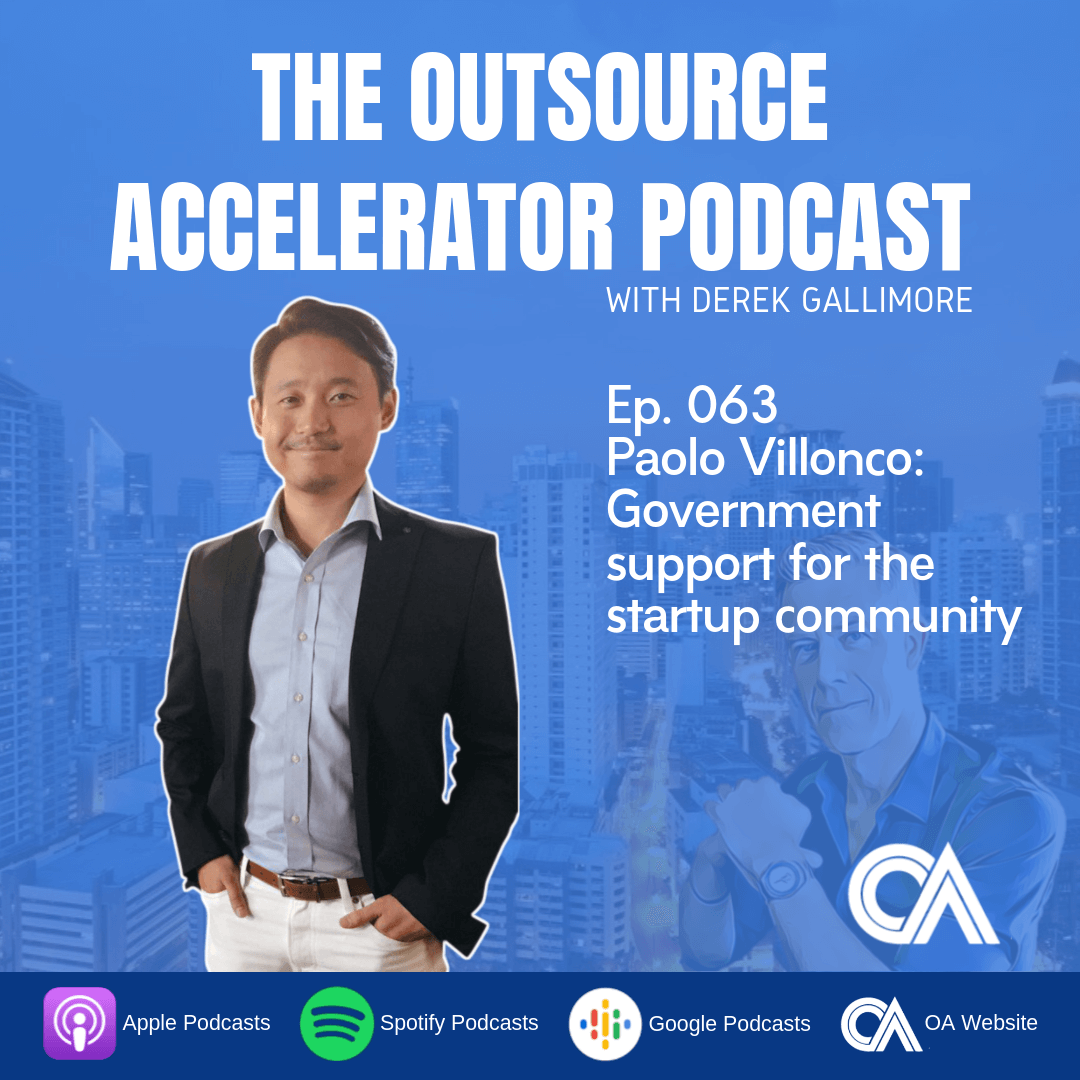Derek is joined by Paolo in the third and final installment of their three-part interview. They will talk about the government support for the startup community in the Philippines.
Welcome to another episode of the Outsource Accelerator Podcast. My name is Derek Gallimore and we are joined today by Paolo Villonco. This is part three of a three-part interview with Paolo. He is the CEO and co-founder of ignition which is a funky co-working space innovation hub and incubator. So, we have had a really fascinating chat with Paolo Villonco and I encourage you to listen to episode 60 and 62 the first two parts. In this episode in this part final part, we explore the support of Philippine government for startups and for the Philippines to play into its strengths. Now, this is again a great episode and I encourage everyone to listen to it because it is so relevant for every business owner in that we are all eager to get the best skills possible for the roles that we need and we really explore this in this episode. And also, I think we illustrate the fantastic thriving potential that there is in the Philippines. So, we jumped straight into this with Paolo as he starts to discuss the Government support for the startup community here in the Philippines. Enjoy.
Paolo: Another thing that I am right now and I am a bit of an advocate of is you know like trying to expose the Philippine government to investing in technology or startups that Filipinos have or the Philippines has a competitive advantage on right. Using your sports analogy, I think the Philippines has I mean we have a passion for basketball. The problem is we’re not biologically.
Derek: You’re not the tallest of the bunch.
Paolo: Yeah. Which is really like for me like why are we so obsessed with financing basketball when you know maybe Filipinos are biologically better or has more potential maybe in gymnastics because we’re shorter or you know in other sports. So, I when I was discussing with some people in the scientific community in the Philippines I was saying you know I love the fact that startups picking up here but the pace like when people working on certain apps here they have this idea, it’s much slower than let’s say you go again with the Silicon Valley or Dubai or London, Hong Kong or these other innovation hubs. They’ve come up with probably 10 iterations where these guys are just building their prototype or first iteration. And so, I’m trying to open up the minds of our scientific community here in the startup community to think about things, areas where we have a competitive advantage and the field of top of mind for me is biotech. The Philippines is one of the richest biodiverse countries in the world. And we have ignored it. Like for me, Dubai is a center for innovation. I mean the Middle East they are spending a lot on these innovation centers and expertise. But I feel like they’ll never be as good as the Philippines when it comes to biotech. I mean potentially because that’s a desert over there. While here we have all of the flora, fauna to study experiment on. Right. And we’re not we are not exploiting that we’re not.
Derek: there’s a huge potential because apparently where you are situated in a world that is particularly good for like coffee, a good cow and things like that but it’s not really.
Paolo: Yeah.
Derek: Utilized
Paolo: It is not. It is in fact underutilized.
Derek: So, tell me about the government. You know it’s probably I mean the Government doesn’t have as much money to splash as Dubai. I have seen a lot of this a lot of proactive Government support.
Paolo: Sure.
Derek: And some Government initiatives. And I don’t know the anagrams with this like the DTI and the.
Paolo: Yeah DOST, PCIEERD there’s so many initiatives but.
Derek: And it’s amazing they’re really getting into the grassroots and supporting them being seen.
Paolo: That is the big. I think one of the things that when I first got back I was very excited about because I mean for our government it’s really hard to get momentum. And it feels like there is momentum right now. I mean it’s not perfect. I mean but I think in terms of initiatives and in terms of intention you can see the intention is there. The movement is there, the momentum is there but it’s a little bit disjointed like these departments could I think coordinate better. In terms of information sharing, they have they operate in Silos like one doesn’t know what the other one is doing. And you know you’re like double work sometimes. But you know it doesn’t as they say you know Rome wasn’t built in a day. I mean you really have to like it takes time but I think the building blocks are there. The initiatives are there. It’s moving forward.
Derek: And I see it. You know I go to some of these hackathons and pitch fest and startups and there’s a lot of young, enthusiastic kids there which is great. But you know a lot of them have a bit of Government funding or a bit of Government support and it’s amazing.
Paolo: Yeah. You know I’m not sure if this is really accurate but right now I’m remembering a discussion where with some Government agencies and I was told that they give up to $100,000 in grant money that is not an investment, it’s not an equity or a loan. It’s grant.
Derek: That’s nice. We should get that.
Paolo: Maybe you should apply. So, it’s not like, it’s not serious Silicon Valley money but it isn’t chump change either.
Derek: And also, I mean there’s lower cost of building stuff out here.
Paolo: Yeah lower cost, exactly. Cost of living is so much cheaper here. Cost of labor for your team is so much cheaper here. You can do a lot with that $100,000.
Derek: Which actually brings me to a point that I find really exciting is. And maybe TaskUs do this a little bit but there’s the concept of and I take this idea I think it’s amazing. But having all these Silicon Valley startups taking their operations completely away from them and effectively having like a virtual COO function. And you know take these well-funded Silicon Valley startups but their kids, they don’t have a lot of functional experience in operations and do it here for them you know because there’s the skills here you get very good executive management here and you could literally manage all of the operational functions of any kind of startup. But also for a huge cost advantage.
Paolo: Yeah, no I totally agree. Just.
Derek: And it’s always adding. So, it’s like you know because outsourcing and a lot of people listening to this listen because of outsourcing but it’s almost like outsourcing on steroids, isn’t it? You know it’s like getting everything done and then it’s a value add for the Philippines. It’s not just you know we have another call center.
Paolo: Yes. Just to share with you just really like that’s what I see every day like we have freelancers here that are working on projects in Estonia, in London, in New York. And it’s amazing how small the world is getting. And we have some people here working on cryptocurrency. I mean you don’t have to. You don’t have that added transaction costs of you know banks. And you know things are moving so quickly. And what I think the Philippines has in terms of advantage with other English-speaking countries is culturally I think it’s very easy to get along with Filipinos. And I think communication is because of culture and because of language it’s fairly easy and it’s not, the skill sets of Filipinos are also increasing.
Derek: And as well because you said U.S. borders are becoming less relevant. And just the spread of knowledge is happening so fast now you know. Because if it was 30 years ago it would take cryptocurrency might take a decade to get to the Philippines whereas now it’s instantaneous because everyone’s reading the same blogs.
Paolo: Exactly.
Derek: And that’s why I think you know the acceleration of affluence and skills in the Philippines is going to happen so much quicker because they’re working on, you know these kids working on cryptocurrency, these kids working on whatever web technology, IT the same as in Silicon Valley.
Paolo: Yes. I mean the Filipinos or the exposure to global trends is so much quicker. Education is so much quicker and opportunities really have been democratized. Before, in order for you to be identified as a skilled employee or an outsourced freelancer you have to go through these channels like H.R. agencies. Now people find jobs on LinkedIn, right. On social media platforms, I mean there’s so many ways to connect and it’s also much easier to verify. I mean I am an extremely private person so I’m very careful about everything that I upload online on my social media account. But I mean everyone has a history on line if any if you did anything foolish or anything like that it’s. Google remembers everything. Like unless like I don’t know this, how far this has come forward but I know there are some legal issues and the right to be forgotten but everything is there on a person. So.
Derek: And I mean the nice thing is now you know the Philippines is always a low salary place. But I think very quickly there’s more of a meritocracy because if you can get the same IT job done in the Philippines or in central London and you pitch for that job it shouldn’t matter where you are sitting as long as you give the same output or result which is a huge potential for the Philippines to be earning central London salaries if they’re as good as the central London candidate.
Paolo: Yeah, no I agree. And you know that and that incentivizes people to up their skillset even more because they know that you know. I don’t have to go through these traditional channels like coming from this particular school and then going through these HR companies or these feeder global multinationals to get that exposure to new jobs. Precisely what you’ve been pointing out.
Derek: Now, that’s amazing. Thank you for the insight. And if anyone wants to get in touch with you or Ignition, how should they find out and we can put all of your contact details on the show notes.
Paolo: Great. Well you could e-mail me at my e-mail [email protected] and also check out our website.
Derek: Which is ignition.biz
Paolo: Yes, www.ignition.biz
Derek: Yeah, fantastic. Thank you, Paolo.
Paolo: Yeah sure. Great.
OK that’s part 3 of 3 with Paolo Villonco. Hope you enjoyed them. I certainly learned a huge amount speaking to him. And if you want to get in touch with Paolo or want to know any more go to our show notes. This is at outsourceaccelerator.com/63. And if you want to ask us anything please do so at [email protected]









 Independent
Independent




